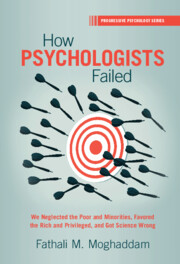 How Psychologists Failed
How Psychologists Failed Book contents
- HOW PSYCHOLOGISTS FAILED
- The Progressive Psychology Book Series
- How Psychologists Failed
- Copyright page
- Dedication
- Contents
- Preface
- Acknowledgments
- Chapter 1 Why We Must Rethink Psychology
- Part I Psychological Processes
- Chapter 2 Cognition and Decision-Making in Societal Context
- Chapter 3 Mis-measuring Intelligence and Justifying Educational Inequalities
- Chapter 4 Personality and the Power of Context
- Chapter 5 Consciousness: Decontextualized and Contextualized Approaches
- Chapter 6 Motivation and Resilience: Self-Help Myths and the Reality of Invisibility
- Chapter 7 Group Life and Diversity
- Part II Rethinking Behavior in the Larger World
- Part III Looking Ahead
- Notes
- References
- Index
Chapter 5 - Consciousness: Decontextualized and Contextualized Approaches
from Part I - Psychological Processes
Published online by Cambridge University Press: 27 October 2022
- HOW PSYCHOLOGISTS FAILED
- The Progressive Psychology Book Series
- How Psychologists Failed
- Copyright page
- Dedication
- Contents
- Preface
- Acknowledgments
- Chapter 1 Why We Must Rethink Psychology
- Part I Psychological Processes
- Chapter 2 Cognition and Decision-Making in Societal Context
- Chapter 3 Mis-measuring Intelligence and Justifying Educational Inequalities
- Chapter 4 Personality and the Power of Context
- Chapter 5 Consciousness: Decontextualized and Contextualized Approaches
- Chapter 6 Motivation and Resilience: Self-Help Myths and the Reality of Invisibility
- Chapter 7 Group Life and Diversity
- Part II Rethinking Behavior in the Larger World
- Part III Looking Ahead
- Notes
- References
- Index
Summary
Consciousness has been studied in mainstream psychology, but in a decontextualized way, as if individuals take shape in a vacuum. This decontextualized approach has resulted in the rejection of free will; as B. F. Skinner said, a science based on causation must exclude free will. At the same time, psychology works within the culture of self-help and individual responsibility, which contradicts the idea of there being no free will. These contradictions are resolved when we adopt a contextualized approach to understanding consciousness, which begins with the premise that consciousnes emerges through society merging into the individual, and the individual merging into society. The consciousness that emerges through socialization is highly dependent on group members, particularly social class. Through a contextualized 'from societies too cells' analysis, it becomes clear that the nature of consciousness depends in important ways on social class experiences.
Keywords
- Type
- Chapter
- Information
- How Psychologists FailedWe Neglected the Poor and Minorities, Favored the Rich and Privileged, and Got Science Wrong, pp. 59 - 73Publisher: Cambridge University PressPrint publication year: 2022
